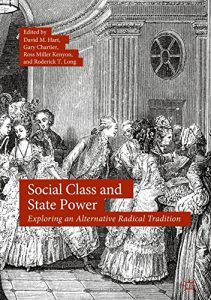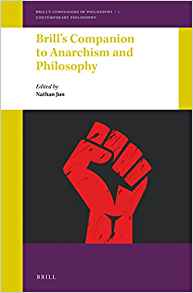I confess to a certain Schadenfreude about this.
Tag Archives | Left-Libertarian
Class Act
[cross-posted at BHL]
Karl Marx once wrote:
I do not claim to have discovered either the existence of classes in modern society or the struggle between them. Long before me, bourgeois historians had described the historical development of this struggle between the classes, as had bourgeois economists their economic anatomy. My own contribution was
1. to show that the existence of classes is merely bound up with certain historical phases in the development of production;
2. that the class struggle necessarily leads to the dictatorship of the proletariat;
3. that this dictatorship itself constitutes no more than a transition to the abolition of all classes and to a classless society.
Marx is certainly right that class analysis was a central feature of classical liberalism long before he picked it up. He’s fibbing a bit, though, about (1) and (3); many of his bourgeois predecessors (for example, the Censeur triumvirate of Charles Comte, Charles Dunoyer, and Augustin Thierry) most emphatically thought that class society as they understood it was a temporary phenomenon destined to be displaced. Thierry, for example, announces:
Federations will replace states; the loose but indissoluble chains of interest will replace the despotism of men and of laws; the tendency towards government, the first passion of the human race, will cede to the free community. The era of empire is over, the era of association begins.
The main difference between Marx and the liberals was that Marx took the differentiation between ruling and ruled classes to be grounded in differential access to the means of production, whereas the liberals took the differentiation between ruling and ruled classes to be grounded in differential access to predatory power, and in particular to the power of the state. (To be sure, Marx acknowledged and indeed insisted on the important role of the state in maintaining class division when examining the details of history or current events; but the state quickly receded in importance when he turned to abstract theory.)
All this is by way of noting that I just received in the mail my author’s copy of Social Class and State Power: Exploring an Alternative Radical Tradition, an anthology of libertarian and classical liberal writings on class analysis that I co-edited with David Hart, Gary Chartier, and Ross Kenyon.
The volume includes material by a rather heterogeneous collection of authors:
- from the 17th century, Richard Overton;
- from the 18th century, Adam Smith, Thomas Paine, Vicesimus Knox, and William Godwin;
- from the 19th century, Jeremy Bentham, James Mill, Thomas Hodgskin, John Wade, William Leggett, Richard Cobden, John C. Calhoun, Adolphe Blanqui, Frédéric Bastiat, Charles Renouard, Augustin Thierry, Gustave de Molinari, Herbert Spencer, William Graham Sumner, Lysander Spooner, and Benjamin Tucker;
- and from the 20th century, Franz Oppenheimer, Albert J. Nock, Ludwig von Mises, Murray Rothbard, Roy Childs, Walter Grinder, John Hagel, Hans Hoppe, and your humble correspondent.
I would urge you to go out and buy a copy; but in light of the book’s $100 pricetag, I’ll just urge you to go out and suggest to your local research library that they buy a copy.
Two New Publications
[cross-posted at C4SS and BHL]
My chapter on “Anarchism and Libertarianism” is forthcoming in Nathan Jun, ed., Brill’s Companion to Anarchism and Philosophy (Leiden: Brill, 2017), at the usual insane Brill price. In the chapter I explore the relationship between libertarianism (in the free-market sense) and the anarchist movement, including the question whether anarcho-capitalism counts as a genuine form of anarchism. (My C4SS colleague Kevin Carson has a chapter in the book as well.)
According to the publisher, I’m only allowed to make 25 hard copies of the chapter – but I’m also allowed to post a copy online, so long as it’s on my personal website. That seems to me a bit like saying “No smoking allowed in this room, but it’s okay to set the bed on fire.” But okay, here’s a link to the chapter.
(My reference to capitalist labour markets as “oligopolistic” was supposed to be “oligopsonistic.” The editors changed it to “oligopolistic,” which of course has the opposite meaning; I changed it back in galleys, but it ended up “oligopolistic” in the final published text nonetheless. Sigh.)
I also have a chapter on “Minarchism on Seasteads” in Victor Tiberius, ed., Seasteads: Opportunities and Challenges for Small New Societies (Zurich: VDF, 2017). I explore options for constraining a seastead minarchy (essentially by incorporating as many anarchist features as possible; those who remember my articles from the FNF/LNF days will find my proposals familiar). Here’s the link.
(The version I’ve posted is the galley proofs with my corrections. No, of course the corrections did not make it into the final published text. Sigh again.)
Scaling Down
[cross-posted at BHL]
Of interest to those involved in either the debate over free-market anarchism or the debate over the relation between government intervention and economies/diseconomies of scale (or both):
In a recent article titled “Do Economies of Scale Exist in Private Protection? Evaluating Nozick’s ‘Invisible Hand’ ,” Brian Meehan argues that contrary to those (like Nozick) who think that even in the absence of violent conflict a competitive market for security firms in a stateless society would tend to evolve toward monopoly, state regulation of private security firms actually tends to result in an increase in firm size and a decrease in number of firms.
Tribaltarian Nation
Insightful quote from Adam Bates:
Q: What is it about the libertarian movement that attracts as you say, “rape apologists, Islamophobes, and nativists?”
A: I think there are two largely distinct strains of belief that lead people to anarchism/libertarianism. One is a fundamental commitment to the liberation of others, and the other is a fundamental and exclusive commitment to the liberation of oneself or one’s tribe.
Both of those sets of people are going to be anti-government, both of them are going to be largely non-interventionist, both of them are going to feel like they support liberty (albeit one definition is universal and the other is tribal), and I think libertarianism has obvious appeal beyond the alternatives.
But with the rise of the social justice movement and increasing global connectivity, we’re seeing that distinction grow starker by the minute. The “tribaltarians” aren’t going to support immigration, they’re not going to support race or culture mixing, they’re not going to support trade, they’re not going to accept any arguments about collective crimes against groups of people that aren’t them, they’re going to recoil at any and every effort to erase the philosophical and moral buffers between “them” and “us.”
So I get it. I get how they got here. But if there ever was a reason for these two groups of people to caucus together, it has now evaporated entirely.
I’m also reminded of Rand’s analysis of tribalism [link goes to an MS Word document]. (The fact that Rand herself was frequently guilty of tribalism doesn’t make her analysis any less useful.)
Merchants of Venice; or, the Liberty of Strangers
Last night I dreamed that I was living back in Ithaca (or somewhere very much like Ithaca), and that I was organising an APEE panel with Walter Block on the subject of Venetian libertarianism.
In the real world, I haven’t lived in Ithaca for nearly three decades; and while I am currently organising an APEE panel, I’m not doing it with Walter and it’s not on Venetian libertarianism.
But when I woke up, the reference to Venetian libertarianism reminded me of this passage from William Thomas, a Renaissance-era Welsh traveller who described his visit to Venice in a 1549 memoir:
All men, specially strangers, have so much liberty there that though they speak very ill by the Venetians, so they attempt nothing in effect against their state, no man shall control them for it. … Further, he that dwelleth in Venice may reckon himself exempt from subjection. For no man there marketh another’s doings, or that meddleth with another man’s living. If thou be a papist, there shalt thou want no kind of superstition to feed upon. If thou be a gospeler, no man shall ask why thou comest not to church. If thou be a Jew, a Turk, or believest in the devil (so thou spread not thine opinions abroad), thou art free from all controlment. For eating of flesh in thine own house, what day soever it be, it maketh no matter. And generally of all other things, so thou offend no man privately, no man shall offend thee, which undoubtedly is one principal cause that draweth so many strangers thither.
(William Thomas, The History of Italy (1549), ed. George B. Parks (Ithaca NY: Cornell University Press, 1963), p. 83.)
 Of course, the requirement to “spread not thine opinions abroad” (at least in matters of religion) suggests that this freedom had its limits – though I’m not sure whether Thomas intends this restriction to apply to all three of the non-Christian religions he references, or only to devil worship. Still, Thomas’s description of Venice is reminiscent of Voltaire’s and Addison’s descriptions of the London stock exchange; all three passages illustrate commercial society’s capacity to promote cosmopolitanism and toleration.
Of course, the requirement to “spread not thine opinions abroad” (at least in matters of religion) suggests that this freedom had its limits – though I’m not sure whether Thomas intends this restriction to apply to all three of the non-Christian religions he references, or only to devil worship. Still, Thomas’s description of Venice is reminiscent of Voltaire’s and Addison’s descriptions of the London stock exchange; all three passages illustrate commercial society’s capacity to promote cosmopolitanism and toleration.


